Prayer
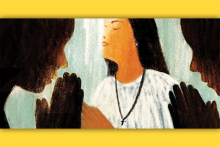
There are prayers shouted into steering wheels
in the seconds between heartbreak and red lights.
Some bargain like hagglers in a storm,
others are pure surrender.
And then, there are those that say only: please.
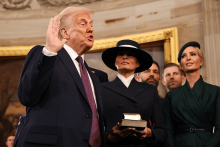
President Donald Trump’s inauguration as the 47th president was filled with religious imagery that often projected God’s blessing on Trump’s promises of American domination, expansion, and nationalism.

Two queer pastors, Anna Blaedel and M Jade Kaiser, were having dinner together in 2017, when they posed a question to each other in the spirit of meaningful fun: What would it be like if they could create a public space for conversations about and liturgical resources for transformation, at the outer margins of Christianity and beyond?

In the quiet oratory of Holy Wisdom Monastery in Middleton, Wisc., I spent my mornings gazing at the face of Jesus. On the far wall of the room where we prayed hung an icon of Jesus holding a tablet that read, “Behold, I make all things new.” Outside the prairie was a technicolor parade of coneflowers, whorled milkweed, and purple loosestrife, while robins, cardinals, and song sparrows continued their song; but it was hard for me to believe that Christ was making things new in the present.
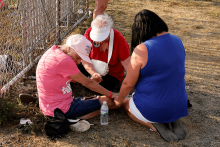
Disarm us, O Lord — our minds, lips, and hearts, and hands — that we may more perfectly love you.

After the South Carolina Gamecocks women’s basketball team won the NCAAW championship on April 7, 2024, the team’s deeply emotional head coach Dawn Staley attributed the historic win to God: “We serve an unbelievable God — we serve an unbelievable God.” Staley continued, “Uncommon favor, unbelievable.”
What does “uncommon favor” mean exactly? Typically, that phrase has been used in church spaces to denote an unexpected blessing. In Staley’s case, we find her crediting God for blessing her and the Gamecocks with a national championship.
Is this uncommon favor?

Do you ever wonder if calling your representatives makes a difference? Do you ever wonder if prayer yields fruit? Considering all the injustice in the world, I think those are fair questions to ponder.
Since last October, I’ve spent many nights crouched over the bed with my phone on loudspeaker. I’ve been calling my representatives for the passing of H.R. 786, a congressional resolution that urges “an immediate deescalation and cease-fire in Israel and occupied Palestine.” This has been my daily practice.
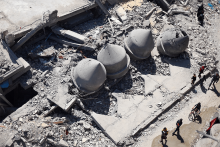
Palestinians in Gaza held the first Friday prayers of Ramadan outside the ruins of a mosque leveled by Israel’s offensive, one of hundreds the Hamas-run authorities say have been damaged or destroyed by Israeli attacks since October.

CHRISTIAN MYSTICS HAVE a definite dramatic streak. Their transformative encounters with God are full of divine revelations (Julian of Norwich), ecstatic visions (Teresa of Ávila), stigmata (Francis of Assisi), erotic imagery (John of the Cross), and all manner of artistic compositions (here’s to you, Hildegard of Bingen).
But then there’s Brother Lawrence who — if he is known at all — is known for experiencing God’s presence as he washed dishes, cooked eggs, or did other monotonous chores that came with life in a 17th-century French monastery.
Born Nicolas Herman, he emerged from one of Europe’s deadliest religious wars a disabled veteran. Haunted by his past actions and convinced he was eternally condemned, he failed as a hermit (too much time alone with his thoughts), then as a footman (“a clumsy oaf who broke everything,” he recalled), before eventually joining the lay brothers of the Order of the Discalced Carmelites in Paris in 1640. Yet Brother Lawrence’s anxiety persisted. When he tried to pray, he spent the whole time “rejecting thoughts and then tumbling back into these same thoughts.” Eventually, he gave up all his spiritual exercises and focused on becoming aware of God’s presence as he did his assigned work in the monastery’s kitchen. What he experienced wasn’t a celestial vision, but what he had sought all along: God’s peace.
“We go to such great lengths, trying to remain in the presence of God by so many methods,” he told a friend who posthumously published Lawrence’s modest writings and letters. “Isn’t it much shorter and more direct to do everything for the love of God?”
Carmen Acevedo Butcher, an award-winning translator of mystical and classic Christian texts, was drawn to Brother Lawrence’s gentle practice. Acevedo Butcher herself grew up saddled with severe “self-loathing” and anxiety from a childhood shaped by trauma, hellfire preaching, and the strain of being “a brown girl in a white society.” But in Lawrence’s writing she finds someone who experienced real Love amid real pain.
In Practice of the Presence, Acevedo Butcher’s new English translation of Brother Lawrence, she emphasizes his embodied joy and his “original welcoming spirit,” which she sees in his frequent use of tout le monde — “for everybody.” Drawing on Lawrence’s deeply trinitarian theology, Acevedo Butcher uses they/them pronouns for God, a move she hopes will communicate Lawrence’s kind, inclusive understanding of Love to a wide audience. Acevedo Butcher spoke with Sojourners’ Betsy Shirley about translation, mysticism, and how Brother Lawrence’s practice connects to the work of social justice today.

Sometimes our nation and world are so full of injustice, loss, and pain that words fail us and our spirit can find no rest. We don’t even know what to say, how to pray, and where to begin to set right the many things that are so overwhelmingly wrong. The vicious murder of Tyre Nichols feels like one of those moments.

With his knife, brightly colored paper, and the meditations of his heart, Benjamin PowerGriffin cuts “what prayer feels like, or what I yearn for it to feel like,” he said.

Shepherding God, be palpably present with us when we dance, snuggle, and enjoy the sensations of the creation you declare good.
Help us to name, define, redefine, deconstruct, claim, and properly pronoun our fabulousness. We commit to properly naming and pronouning the fabulousness of others.
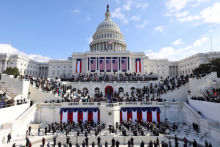
At President Joe Biden’s inauguration, Rev. Leo O’Donovan, SJ, invoked the “Holy Mystery of Love” to be with us “as we dream together.”

Shortly before Joe Biden was sworn in as the 46th president of the United States, Rev. Leo O’Donovan, SJ, a longtime friend and mentor of President Biden's, delivered this prayer.
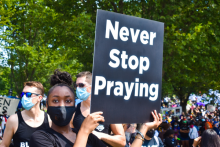
As the Inauguration Day nears, one thing is clear: The U.S. needs as many prayers as possible. Here are places where you can pray virtually, both before and after new elected officials take office.
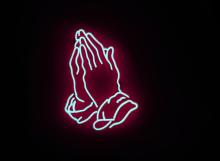
As Election Day nears, one thing is clear: We all need as many prayers as possible. After you vote, while you wait in line to vote, or while you anxiously tune in as votes are tallied, here are places that you can pray on Election Day.
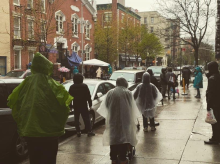
Much has been written about the ways in which the pandemic is exposing the fragility of our communities and the underlying vulnerabilities that were ignored. Over the years, Father’s Heart has tried to do what it can to knit the fraying margins of the neighborhood back into the whole, by reminding people of their God-given dignity and worth. But they are working against decades-long policies that have kept so many New Yorkers from accessing affordable housing and better paying jobs.

As the plague continued to spread with every cough, they blamed a lunar eclipse and the malignant forces of Saturn, Jupiter, and Mars for deadly vapors arriving on currents of air, passing into the blood stream. They hypothesized that this “corrupted air … penetrates to the heart” and “destroys the life force.” From where else could this curse have come? A product of “divine will” they decreed, and urged the people “to return humbly to God.”

Ash Wednesday 2020 marked a meat-free decade for me, a spiritual choice I made in 2010, just after I became engaged to a devout Hindu. What began as both a Lenten fast of solidarity and desperation — my husband is the cook, I am not — has held steady. A liturgical season turned into a year, then another and another. At each meal, I’ve made choice: Do I eat meat or not? Why or why not?
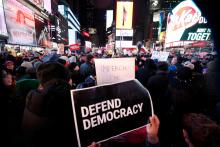
We can respect a diversity of Christian opinion around whether impeachment is the necessary and only remedy to the president’s actions and whether the president’s offenses rise to the constitutional level of "Treason, Bribery, or other high Crimes and Misdemeanors.” But what I can’t understand or respect are direct efforts to subvert the truth, deflect attention, and defend the indefensible.